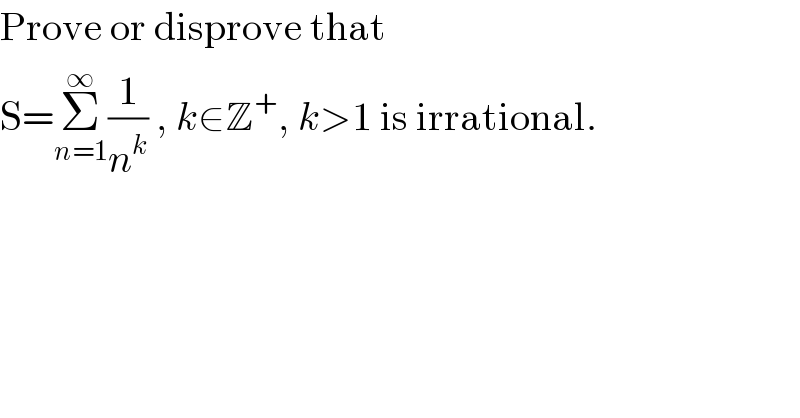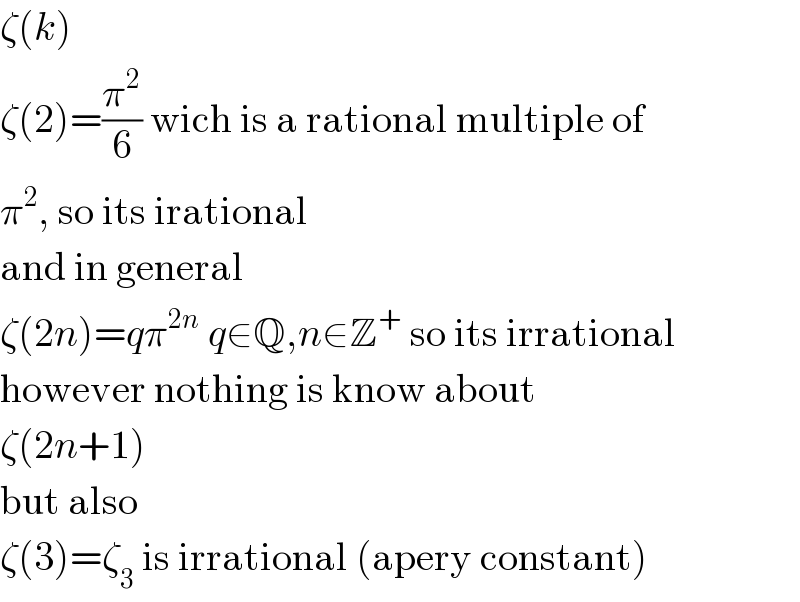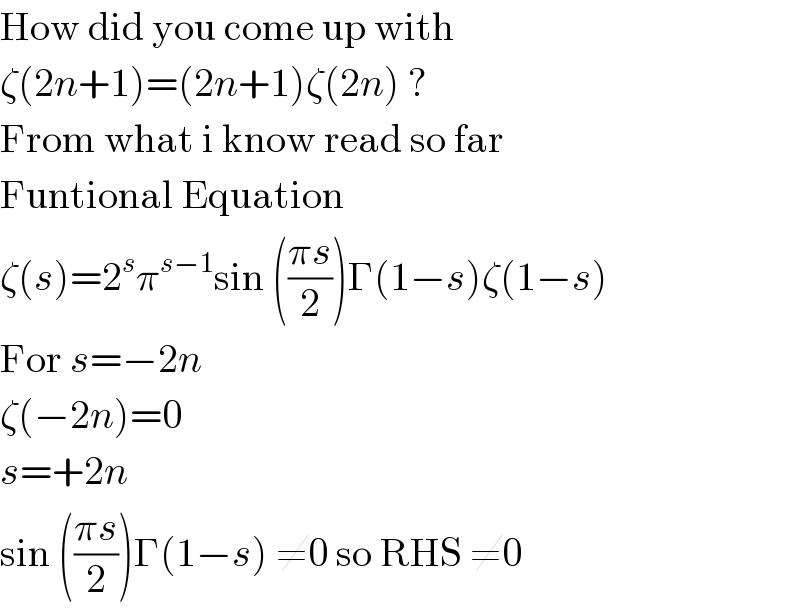
Question Number 3138 by prakash jain last updated on 05/Dec/15

$$\mathrm{Prove}\:\mathrm{or}\:\mathrm{disprove}\:\mathrm{that} \\ $$ $$\mathrm{S}=\underset{{n}=\mathrm{1}} {\overset{\infty} {\sum}}\frac{\mathrm{1}}{{n}^{{k}} }\:,\:{k}\in\mathbb{Z}^{+} ,\:{k}>\mathrm{1}\:\mathrm{is}\:\mathrm{irrational}. \\ $$
Commented by123456 last updated on 05/Dec/15

$$\zeta\left({k}\right) \\ $$ $$\zeta\left(\mathrm{2}\right)=\frac{\pi^{\mathrm{2}} }{\mathrm{6}}\:\mathrm{wich}\:\mathrm{is}\:\mathrm{a}\:\mathrm{rational}\:\mathrm{multiple}\:\mathrm{of} \\ $$ $$\pi^{\mathrm{2}} ,\:\mathrm{so}\:\mathrm{its}\:\mathrm{irational} \\ $$ $$\mathrm{and}\:\mathrm{in}\:\mathrm{general} \\ $$ $$\zeta\left(\mathrm{2}{n}\right)={q}\pi^{\mathrm{2}{n}} \:{q}\in\mathbb{Q},{n}\in\mathbb{Z}^{+} \:\mathrm{so}\:\mathrm{its}\:\mathrm{irrational} \\ $$ $$\mathrm{however}\:\mathrm{nothing}\:\mathrm{is}\:\mathrm{know}\:\mathrm{about} \\ $$ $$\zeta\left(\mathrm{2}{n}+\mathrm{1}\right) \\ $$ $$\mathrm{but}\:\mathrm{also} \\ $$ $$\zeta\left(\mathrm{3}\right)=\zeta_{\mathrm{3}} \:\mathrm{is}\:\mathrm{irrational}\:\left(\mathrm{apery}\:\mathrm{constant}\right) \\ $$
Commented byFilup last updated on 06/Dec/15

$$\zeta\left(\mathrm{2}{n}+\mathrm{1}\right)=\zeta\left(\mathrm{2}{n}\right)\left(\mathrm{2}{n}+\mathrm{1}\right) \\ $$
Commented byprakash jain last updated on 06/Dec/15

$$\mathrm{How}\:\mathrm{did}\:\mathrm{you}\:\mathrm{come}\:\mathrm{up}\:\mathrm{with} \\ $$ $$\zeta\left(\mathrm{2}{n}+\mathrm{1}\right)=\left(\mathrm{2}{n}+\mathrm{1}\right)\zeta\left(\mathrm{2}{n}\right)\:? \\ $$ $$\mathrm{From}\:\mathrm{what}\:\mathrm{i}\:\mathrm{know}\:\mathrm{read}\:\mathrm{so}\:\mathrm{far} \\ $$ $$\mathrm{Funtional}\:\mathrm{Equation} \\ $$ $$\zeta\left({s}\right)=\mathrm{2}^{{s}} \pi^{{s}−\mathrm{1}} \mathrm{sin}\:\left(\frac{\pi{s}}{\mathrm{2}}\right)\Gamma\left(\mathrm{1}−{s}\right)\zeta\left(\mathrm{1}−{s}\right) \\ $$ $$\mathrm{For}\:{s}=−\mathrm{2}{n}\: \\ $$ $$\zeta\left(−\mathrm{2}{n}\right)=\mathrm{0} \\ $$ $${s}=+\mathrm{2}{n} \\ $$ $$\mathrm{sin}\:\left(\frac{\pi{s}}{\mathrm{2}}\right)\Gamma\left(\mathrm{1}−{s}\right)\:\neq\mathrm{0}\:\mathrm{so}\:\mathrm{RHS}\:\neq\mathrm{0} \\ $$
Commented byFilup last updated on 06/Dec/15

$$\mathrm{sorry},\:{my}\:{mistake}!!! \\ $$ $$\mathrm{i}\:\mathrm{was}\:\mathrm{thinking}\:\mathrm{of}\:\Gamma\left(\mathrm{2}{n}+\mathrm{1}\right)=\Gamma\left(\mathrm{2}{n}\right)\left(\mathrm{2}{n}+\mathrm{1}\right) \\ $$
